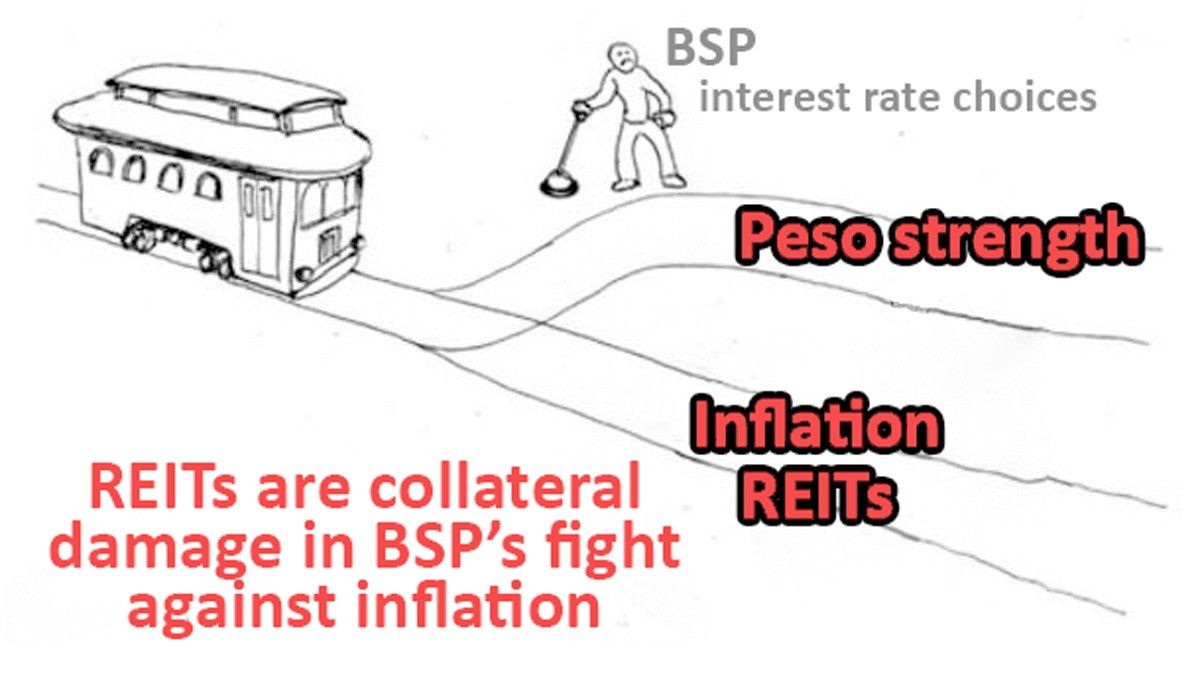Why are REIT stocks falling?
Merkado Barkada
October 19, 2022 | 09:00
Thanks to Justine for the question. The quick answer is that REIT stocks are falling because the risk-free rate of return is rising, but let’s review. So right off the bat, REITs are somewhat of a different investment product to stocks, as their main selling point is access to a stable income stream through dividends.
The stock price goes up and down based on the demand for that stream of income. The better the income stream, in terms of stability and growth potential, the more an investor would be willing to pay for it. This demand drives up the price of the stock, but the demand does nothing to the dividends; they are the same regardless of the request. So, as the stock price increases relative to the dividend, the estimated yield decreases. But it makes sense, since you’re paying more for the same amount of income.
The reverse is also true: the worse the income stream, the less an investor would be willing to pay for it, the lack of demand drives the stock price down, and the estimated yield rises relative to that stock price. falling stock. Ok, so that’s a very high-level look at REIT price dynamics.
But back to the question: why are prices falling now? Well, it has to do with a lack of demand, and as we have seen, a lack of demand causes prices to fall and yields to rise. The demand for REITs is declining because interest rates are rising, and as interest rates rise, the yields of almost all fixed income products also rise. Government bills and bonds pay higher returns. Bonds and corporate notes pay higher returns. Treasuries, which are almost risk free, fell from 1.36% in September 2021 to 3.38% in September 2022. The ability to earn a decent return with a lower risk profile is thought to have increased the competition for fixed rate securities. investment income that was originally intended for REITs in Q4/21 and Q1/22. So, as these investors buy other products or sell REITs to buy other products, the demand for REIT shares decreases, the prices of REIT shares go down, and their returns increase.
MB RESULTS
REITs will be under selling pressure until the market has a better idea of how high rates need to be to keep inflation under control.
We are not there yet.
If the BSP is still talking about consecutive increases in November and December, it will further increase the yield of these lower-risk investment products like government debt and corporate debt, and depress the prices of riskier yields like REITs. .
Luckily for REIT bag holders, REIT companies that still focus on growth while offering a stable dividend will retain more of their value through this downtrend than other REITs that fail to do it.
At least that’s how it should work on paper, but as we saw with Filinvest REIT [FILRT 5.74 0.70%]the market does not always react as we would normally expect to a sudden and unexplained 50% drop in the quarterly dividend.
Likewise, with Citigroup Energy REIT [CREIT 2.23 1.36%]which is not vulnerable to the POGO “sword of Damocles” on Metro Manila commercial rental rates, the market does not always appreciate the strength of this revenue stream as we would normally expect.
Could these REIT market inefficiencies be exploited? I do not know. Is it a good time to buy REITs or to sell REITs if you own them?
In either case, your decision to buy or sell is based on your own investment goals which I cannot know.
What works for me might not work for you.
All I know is that in the short term, REITs are not likely to “shine” and price pressure should persist until there is a sustained light at the end of the tunnel. ‘inflation.
—


Comments are closed.